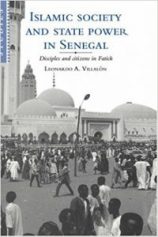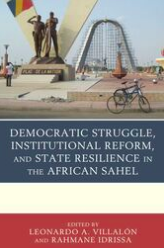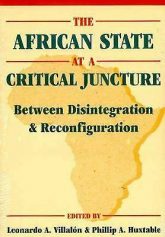Villalón is the general editor of the recent 40-chapter Oxford Handbook of the African Sahel (2021) and author or editor of several other books and publications.
BOOKS:
The Oxford Handbook of the Sahel
 Long on the margins of both scholarly and policy concerns, the countries of the West African Sahel have recently attracted world attention, primarily as a key battleground in the global ‘war on terror’. This book moves beyond this narrow focus, providing a multidimensional and interdisciplinary assessment of the region in all of its complexity. The focus is on the six countries at the heart of the Sahelian geographic space: Senegal, Mauritania, Mali, Burkina Faso, Niger, and Chad. Collectively, the chapters explore the commonalities and interconnections that link these countries and their fates, while also underscoring their diversity and the variations in their current realities. In nine thematic sections, the chapters in this book offer holistic analyses of the key forces shaping the region. Including scholars based in Africa, Europe, and the United States, the authors represent an exceptional breadth and depth of expertise on the Sahel.
Long on the margins of both scholarly and policy concerns, the countries of the West African Sahel have recently attracted world attention, primarily as a key battleground in the global ‘war on terror’. This book moves beyond this narrow focus, providing a multidimensional and interdisciplinary assessment of the region in all of its complexity. The focus is on the six countries at the heart of the Sahelian geographic space: Senegal, Mauritania, Mali, Burkina Faso, Niger, and Chad. Collectively, the chapters explore the commonalities and interconnections that link these countries and their fates, while also underscoring their diversity and the variations in their current realities. In nine thematic sections, the chapters in this book offer holistic analyses of the key forces shaping the region. Including scholars based in Africa, Europe, and the United States, the authors represent an exceptional breadth and depth of expertise on the Sahel.
Islamic Society and State Power in Senegal
 The Sufi Muslim orders to which the vast majority of Senegalese belong are the most significant institutions of social organization in the country. While studies of Islam and politics have tended to focus on the destabilizing force of religiously based groups, the author argues that in Senegal the orders have been a central component of a political system that has been among the most stable in Africa. Focusing on a regional administrative centre, he combines a detailed account of grassroots politics with an analysis of national and international forces to examine the ways in which the internal dynamics of the orders shape the exercise of power by the Senegalese. This is a major study that should be read by every student of Islam and politics as well as of Africa.
The Sufi Muslim orders to which the vast majority of Senegalese belong are the most significant institutions of social organization in the country. While studies of Islam and politics have tended to focus on the destabilizing force of religiously based groups, the author argues that in Senegal the orders have been a central component of a political system that has been among the most stable in Africa. Focusing on a regional administrative centre, he combines a detailed account of grassroots politics with an analysis of national and international forces to examine the ways in which the internal dynamics of the orders shape the exercise of power by the Senegalese. This is a major study that should be read by every student of Islam and politics as well as of Africa.
Democratic Struggle, Institutional Reform, and State Resilience in the African Sahel
 Edited by Leonardo A. Villalón and Abdourahmane Idrissa, Democratic Struggle, Institutional Reform, and State Resilience in the African Sahel addresses a key and little-studied question: How have the politics of democratization across the Francophone Sahel shaped processes of state-building, and with what effects on the resilience of state institutions? Starting from the premise that variation in the politics of institution building and institutional reform—although most frequently justified and debated in terms of democratization—have differing impact on the construction of resilient states , this book examines these processes in six francophone states of the Sahel: Senegal, Mauritania, Mali, Burkina Faso, Niger, and Chad. The contributors represent a set of distinguished scholars from across the region, many of whom have also been important actors in the struggles they analyze.
Edited by Leonardo A. Villalón and Abdourahmane Idrissa, Democratic Struggle, Institutional Reform, and State Resilience in the African Sahel addresses a key and little-studied question: How have the politics of democratization across the Francophone Sahel shaped processes of state-building, and with what effects on the resilience of state institutions? Starting from the premise that variation in the politics of institution building and institutional reform—although most frequently justified and debated in terms of democratization—have differing impact on the construction of resilient states , this book examines these processes in six francophone states of the Sahel: Senegal, Mauritania, Mali, Burkina Faso, Niger, and Chad. The contributors represent a set of distinguished scholars from across the region, many of whom have also been important actors in the struggles they analyze.
Entre le Savoir et le Culte : Activisme et Mouvements Religieux dans les Universités du Sahel
 In many ways, student religious groups represent a microcosm of the religious diversification that is occurring more broadly in Sahelian societies. This book examines this important phenomenon in a comparative manner in six Sahelian countries: Senegal, Mauritania, Mali, Burkina Faso, Niger and Chad. Drawing on significant field research and extensive experience, scholars from each country analyze how national political contexts and key sociological factors have shaped specific patterns of student religious activism on college campuses. As a whole, the book highlights both commonalities and important differences in how religious factors shape higher education and, by extension, the future elite of the Sahel.
In many ways, student religious groups represent a microcosm of the religious diversification that is occurring more broadly in Sahelian societies. This book examines this important phenomenon in a comparative manner in six Sahelian countries: Senegal, Mauritania, Mali, Burkina Faso, Niger and Chad. Drawing on significant field research and extensive experience, scholars from each country analyze how national political contexts and key sociological factors have shaped specific patterns of student religious activism on college campuses. As a whole, the book highlights both commonalities and important differences in how religious factors shape higher education and, by extension, the future elite of the Sahel.
L’économie Morale et les Mutations de L’Islam en Afrique Sub-Saharienne
 Edited by Leonardo A. Villalón and Jean-Louis Triaud, this special issue of the journal Afrique Contemporaine explored key issues shaping contemporary muslim socieities in Africa. Contrary to a sometimes static view of Islam, diversity and plurality are what best characterize the African Muslim world today, as it sits at the intersection of globalized market rules, various “international” Islamic models, and the social and political demands of African societies.
Edited by Leonardo A. Villalón and Jean-Louis Triaud, this special issue of the journal Afrique Contemporaine explored key issues shaping contemporary muslim socieities in Africa. Contrary to a sometimes static view of Islam, diversity and plurality are what best characterize the African Muslim world today, as it sits at the intersection of globalized market rules, various “international” Islamic models, and the social and political demands of African societies.
The Fate of Africa’s Democratic Experiments: Elites and Institutions
 Does Western-style democracy make sense in the various geographic, economic, and social settings of the continent? How far toward democracy have recent liberalization movements gone? In The Fate of Africa’s Democratic Experiments, Leonardo A. Villalón, Peter VonDoepp, and an international group of contributors consider the aftermath, success, failure, and future of the wave of democracy that swept Africa in the early 1990s. In some countries, democratic movements flourished, while in others, democratic success was more circumscribed. This detailed analysis of key political events in countries at the forefront of democratic change–Benin, Central African Republic, Congo, Guinea-Bissau, Madagascar, Malawi, Mali, Mozambique, and Zambia–provides for broadly representative continental and linguistic coverage of directions and prospects for Africa’s democracies.
Does Western-style democracy make sense in the various geographic, economic, and social settings of the continent? How far toward democracy have recent liberalization movements gone? In The Fate of Africa’s Democratic Experiments, Leonardo A. Villalón, Peter VonDoepp, and an international group of contributors consider the aftermath, success, failure, and future of the wave of democracy that swept Africa in the early 1990s. In some countries, democratic movements flourished, while in others, democratic success was more circumscribed. This detailed analysis of key political events in countries at the forefront of democratic change–Benin, Central African Republic, Congo, Guinea-Bissau, Madagascar, Malawi, Mali, Mozambique, and Zambia–provides for broadly representative continental and linguistic coverage of directions and prospects for Africa’s democracies.
The African State at a Critical Juncture : Between Disintegration and Reconfiguration
 After establishing a historical and international context, the authors examine four cases of state collapse and six cases of state reconfiguration. Each case focuses on the relations of state structures with new social actors (or with preexisting social groups with redefined powers), including not only the classic formulations of civil society, but also religious, ethnic, and gender-based groups. A final chapter traces patterns in these cases and sketches likely scenarios for the future.
After establishing a historical and international context, the authors examine four cases of state collapse and six cases of state reconfiguration. Each case focuses on the relations of state structures with new social actors (or with preexisting social groups with redefined powers), including not only the classic formulations of civil society, but also religious, ethnic, and gender-based groups. A final chapter traces patterns in these cases and sketches likely scenarios for the future.
Select Articles and Book Chapters:
- “The Politics of Democratization and the State of the State in the Sahel,” In John Harbeson, ed. Africa in World Politics: Sustaining Reform in a Turbulent World Order. (Seventh Edition). Routledge. 2023. Available here.
- “Moderniser les daaras hier et aujourd’hui : Tensions et négociations autour de la réforme de l’enseignement arabo-islamique.” Co-authored with Mamadou Bodian. In Les Insécurités Économiques et Sociales au Sahel : Enjeux et perspectives. eds. Lamine Ndiaye et Ahmadou Aly Mbaye. Forthcoming, 2023.
- “The political roots of fragility in the G5 Sahel countries: State institutions and the politics of democracy and security.” In 10 years of instability in the Sahel. Regional dynamics and external interventions. eds. Giovanni Carbone and Camillo Casola. ISPI | Istituto per gli Studi di Politica Internazionale: Milan, Italy. 2022. Available here.
- “Reflections on research ethics in complex contexts: Navigating politics, pragmatics, and positionality.” With Irina Branco da Silva. In State, Society and Islam in the Western Regions of the Sahara. Francisco Freire, ed. London: I. B. Tauris. 2022. Available here.
- “The Undoing of a Semi-Authoritarian Regime: The Term Limit Debate and the Fall of Blaise Compaoré in Burkina Faso.” With Daniel Eizenga. In The Politics of Challenging Presidential Term Limits in Africa, edited by Jack Mangala. Palgrave Macmillan, New York. 2020, pp. 141-170. Available here.
- “The Politics of Democratization and State Building in the Sahel.” In Democratic Struggle, Institutional Reform, and State Resilience in the African Sahel. Co-edited with Rahmane Idrissa. Lexington Books/Rowman and Littlefield, Lanham, Maryland. 2020. Available here.
- “Cautious Democrats: Religious Actors and Democratization Processes in Senegal.” In Politics and Religion. 8:2 Cambridge University Press. 2015, pp. 305-333. Available here.
- “Islam et politique à l’ère de la démocratie, et du terrorisme : Itinéraires Ouest-Africains.” In Culture et Religion en Afrique au Seuil du 21ième Siècle: Conscience d’une Renaissance?, ed. I.-P. L. Lalèyê. Dakar: CODESRIA. 2015, pp. 129-154. Available here.
- “Islam et réforme éducative au Sénégal : tensions et négociations vers un modèle hybride.” With Mamadou Bodian. In État, Sociétés et Islam au Sénégal. Un air de nouveau temps?, ed. Abdourahmane Seck, Mayke Kaag, Cheikh Guèye and Abdou Salam Fall. Paris: Karthala. 2015, pp. 73-94. Available here.
- “Islam, the State, and Politics in sub-Saharan Africa.” In The Oxford Handbook of Islam and Politics, ed. John L. Esposito and Emad El-Din Shahin. Oxford University Press, 2013, pp. 379-393. Available here.
- “Negotiating Islam in the Age of Democracy: Senegal in Comparative Regional Perspective.” In Tolerance, Democracy, and Sufis in Senegal. ed. Mamadou Diouf. New York: Columbia University Press. 2013, pp. 239-266. Available here.
- “Rethinking Education in the Sahel: Democracy, Religious Change, and the Politics of Reform,” In Governing Africa’s Changing Societies: Dynamics of Reform. ed. Ellen Lust and Stephen Ndegwa. Boulder: Lynne Rienner publishers. 2012, pp. 177-201. Available here.
- “From Argument to Negotiation: Constructing Democracies in Muslim West Africa.” In Comparative Politics 42:4 (July 2010), pp. 375-393. Available here.
- Reprinted in African Politics, ed. Nic Cheeseman. London: Routledge. 2016.
- “Sufi Modernities in Contemporary Senegal: Religious Dynamics between the Local and the Global.” In Sufism and the Modern in Islam. ed. by Martin van Bruinessen and Julia Day Howell. London: I.B. Tauris. 2007, pp. 172-191. Available here.
- Reprinted in Indonesian translation as: “Modernitas Sufi di Senegal Kontemporer: Dinamika Keagamaan Antara Lokal dan Global.” In Urban Sufism, ed. M. van Bruinessen and J. D. Howell. Jakarta: Rajawali Pers, 2008, pp. 295-332.
- “Senegal: Shades of Islamism on a Sufi landscape?” in Political Islam in West Africa: State-Society Relations Transformed, ed. William F. S. Miles. Lynne Rienner Publishers. 2007, pp. 161-182. Available here.
- “The Moustarchidine of Senegal: The Family Politics of a Contemporary Tijan Movement.” In La Tijâniyya: Une confrérie musulmane à la conquête de l’Afrique, ed. Jean-Louis Triaud and David Robinson. Paris: Karthala, 2000, pp. 469-497. Available here.
- “The Moral and the Political in African Democratization: The Code de la Famille in Niger’s Troubled Transition.” In Democratization 3:2 (Summer 1996), pp. 41-68. Available here.
- “Sufi Rituals as Rallies: Religious Ceremonies in the Politics of Senegalese State-Society Relations.” In Comparative Politics 26:4 (July 1994), pp. 415-437. Available here.